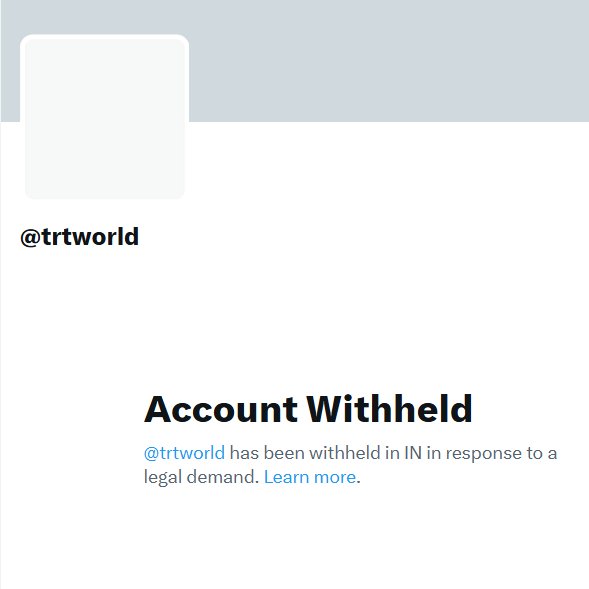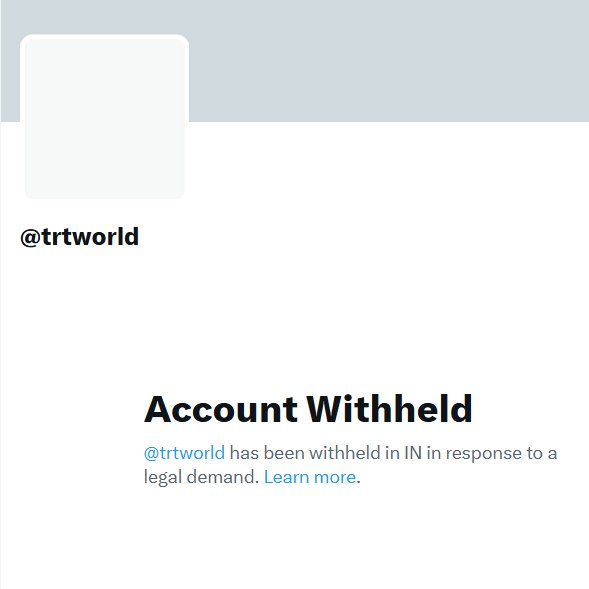
India Blocks Turkish Public Broadcaster TRT’s Social Media Handle
In a significant geopolitical move, India has taken action to block the social media handle of the Turkish public broadcaster TRT (Türkiye Radyo ve Televizyon Kurumu). This decision has stirred discussions and concerns over media freedom, international relations, and the impact of such actions on diplomatic ties between nations. The news was initially reported by journalist Sidhant Sibal on May 14, 2025, and has since captured the attention of both domestic and international audiences.
Background of TRT
TRT is Turkey’s national public broadcaster, established in 1968. It operates numerous television and radio channels, including international services that broadcast in multiple languages. TRT has been known for its unique take on news, often reflecting the Turkish government’s stance on various political and social issues. Over the years, TRT has expanded its reach globally, aiming to promote Turkish culture and perspectives through its broadcasts.
The Blockade’s Implications
The decision to block TRT’s social media handle highlights the complexities of media freedom and cross-border communications. On one hand, it raises questions about India’s commitment to a free and open internet. On the other hand, it reflects the growing tensions between India and Turkey, particularly in light of recent political developments.
Political Context
The political context surrounding this blockade is essential for understanding its implications. Relations between India and Turkey have been historically complex, marked by periods of cooperation and tension. Recent events, such as differing stances on regional conflicts, have contributed to a cooling of relations. The blocking of TRT’s social media handle could be seen as a response to perceived biases in its reporting or as a broader strategy to manage information sources that the Indian government finds problematic.
- YOU MAY ALSO LIKE TO WATCH THIS TRENDING STORY ON YOUTUBE. Waverly Hills Hospital's Horror Story: The Most Haunted Room 502
Media Freedom and Censorship
The blockade raises significant concerns about media freedom and censorship. Critics may argue that such actions limit access to diverse viewpoints and could undermine democratic principles. In an era where information is readily accessible, blocking a major broadcaster can set a concerning precedent. It highlights the ongoing struggle between governments and media outlets regarding the narrative surrounding sensitive political issues.
Why Social Media Matters
Social media plays a crucial role in shaping public opinion and influencing international perceptions. Platforms like Twitter, Facebook, and Instagram have become vital for news dissemination, often serving as primary sources for information. By blocking TRT’s social media handle, India is not only limiting the reach of Turkish narratives but also signaling its stance on how information is managed within its borders.
Reactions from the International Community
The international community has responded with mixed reactions to India’s decision. Some countries and organizations have expressed concern over censorship, urging India to reconsider its stance on media freedom. Others, particularly allies of India, have supported the decision as a necessary action in safeguarding national interests.
The Importance of Dialogue
In the wake of such actions, the importance of dialogue between nations cannot be understated. Open channels of communication are essential for resolving misunderstandings and fostering better international relations. Diplomatic discussions regarding media freedoms and the role of international broadcasters can help mitigate tensions and promote understanding.
The Future of International Broadcasting
As the media landscape evolves, the future of international broadcasting remains uncertain. Governments around the world are increasingly aware of the influence of foreign media on domestic affairs. This awareness could lead to more restrictions on international broadcasters, impacting the global flow of information.
The Role of Technology
In addition to political factors, technological advancements also play a role in shaping the future of broadcasting. Digital platforms have enabled new forms of content distribution, allowing broader access to international news sources. However, governments may also leverage technology to impose restrictions, raising ethical questions about the balance between national security and free speech.
Conclusion
India’s decision to block the Turkish public broadcaster TRT’s social media handle is a complex issue with far-reaching implications. This action reflects the intricate relationship between media freedom, international relations, and national security. As nations navigate these challenges, the importance of maintaining open dialogue and upholding democratic principles remains paramount. The future of international broadcasting will likely be shaped by ongoing developments in technology, policy, and diplomacy, making it essential for stakeholders to engage in constructive discussions about media access and freedom.
In conclusion, as the world continues to grapple with the implications of media censorship and the role of international broadcasters, the actions taken by countries like India will be closely scrutinized. The balance between safeguarding national interests and promoting free expression is a delicate one, and it will be crucial for nations to navigate this landscape thoughtfully in the years to come.

Breaking: India blocks Turkish public broadcaster TRT world’s social media handle. pic.twitter.com/RBwqadMVwD
— Sidhant Sibal (@sidhant) May 14, 2025
Breaking: India Blocks Turkish Public Broadcaster TRT World’s Social Media Handle
The digital landscape is ever-changing, and it can be quite the rollercoaster when it comes to international relations and media. Recently, India made headlines by blocking the social media handle of the Turkish public broadcaster TRT World. This move has sparked a flurry of discussions, debates, and a multitude of questions regarding media freedom, diplomatic ties, and the role of social media in global discourse.
What Happened?
According to a tweet from journalist Sidhant Sibal, India has officially blocked the **TRT World’s social media handle**. This news broke on May 14, 2025, and it immediately caught the attention of media analysts, diplomats, and social media users alike. The implications of this action are profound, as it raises questions about censorship, the freedom of press, and how countries engage with each other in the digital age.
The tweet, which can be seen [here](https://twitter.com/sidhant/status/1922545049537032570?ref_src=twsrc%5Etfw), highlights the growing tension between India and Turkey, particularly regarding the narratives being pushed by each country’s media outlets.
Why Did India Take This Step?
To understand the rationale behind India’s decision, we need to delve into the broader context of India-Turkey relations. Over the years, both nations have had their share of diplomatic rifts, often centered around issues like Kashmir, anti-terrorism efforts, and Turkey’s support for certain groups that India perceives as threats.
India’s action against TRT World can be seen as a strategic move to curb narratives that it considers misleading or harmful. The Indian government has previously taken steps to regulate foreign media operations, especially when they are perceived to be interfering in the country’s internal affairs.
If you look back at the timeline, this isn’t the first time India has taken a hard stance against foreign media. The country has been vigilant in ensuring that foreign media outlets do not misrepresent its policies or socio-political scenarios. In this case, the perceived bias of TRT World against India likely played a significant role in the decision-making process.
Implications for Media Freedom
The blocking of TRT World raises significant concerns about media freedom and censorship. While governments have the right to protect their national interests, the fine line between protecting these interests and suppressing free speech is a delicate one.
International organizations and human rights advocates often argue that such actions can lead to a slippery slope where governments may feel emboldened to silence dissenting voices and control narratives. Freedom of the press is a fundamental human right, and actions like this can undermine that principle.
It’s essential to ask: What does this mean for journalists working in hostile environments? If countries can easily block or censor media outlets, how can journalists ensure that they report on issues without fear of retaliation? This situation emphasizes the need for robust protections for journalists and media organizations operating in various geopolitical climates.
The Role of Social Media in Global Discourse
Social media has revolutionized how news is disseminated and consumed. Platforms like Twitter, Facebook, and Instagram allow for instantaneous sharing of information, making it easier for people to engage with global issues. However, with this power comes responsibility.
When a country blocks a media outlet’s social media handle, it can severely limit the flow of information. Followers and interested parties may miss critical updates, analyses, and perspectives that are essential for a well-rounded understanding of global events.
India’s decision to block TRT World could lead to a significant information gap, where the public is left only with the narratives that the Indian government deems acceptable. This could ultimately lead to a distorted view of international relations, particularly between India and Turkey.
Public Reaction and Media Response
The public’s reaction to India’s decision has been mixed. Some applaud the government’s efforts to control foreign narratives that they feel harm national interest, while others express concern over the implications for press freedom.
Media outlets around the world have also been quick to pick up the story, discussing the potential ramifications of such a move. Commentators on various platforms are debating the balance between national security and freedom of expression, creating an engaging dialogue on the topic.
Furthermore, this incident has highlighted the importance of media literacy. In an age where misinformation can spread like wildfire, it is crucial for individuals to critically evaluate the sources of their information. Understanding the political motivations behind news stories can help readers discern fact from opinion.
Future Prospects for India-Turkey Relations
Looking ahead, the blockage of TRT World could have long-term implications for India-Turkey relations. If both countries do not find common ground, we may see an escalation in diplomatic tensions.
Historically, both nations have engaged in various forms of cooperation, but this recent action could signal a shift in how they interact on the international stage. Diplomats and political analysts will likely be watching closely to see how this situation evolves.
It’s also worth considering how this will affect other media outlets operating in India. Will they face similar scrutiny? How will this shape the landscape of foreign journalism within the country?
What This Means for Global Media
The blocking of TRT World’s social media handle is not just an isolated incident; it’s part of a larger trend where governments are increasingly taking control of narratives. This situation serves as a reminder of the fragile state of media freedom around the globe.
Countries like India, with significant global influence, have the power to shape how information is shared and consumed. This makes it all the more critical for individuals to stay informed and engaged with multiple sources of information.
As consumers of news, we must advocate for transparency and accountability in media reporting. Supporting independent journalism and diverse media voices is essential for fostering a healthy public discourse.
In a world where information is power, staying educated about incidents like India’s blocking of TRT World can help us better understand the complex web of international relations and media dynamics.
Final Thoughts
The landscape of media is constantly evolving, and the recent actions taken by India regarding TRT World serve as a stark reminder of the challenges that lie ahead. As we navigate this complex terrain, it’s vital to stay informed, engaged, and critical of the narratives that shape our understanding of the world.
As this situation unfolds, we must pay close attention to how countries interact with media and how those interactions impact global discourse. The blocking of a media outlet’s social media handle is more than just a single event; it’s a reflection of the ongoing struggle for media freedom and the right to information.
Breaking: India blocks Turkish public broadcaster TRT world's social media handle.
